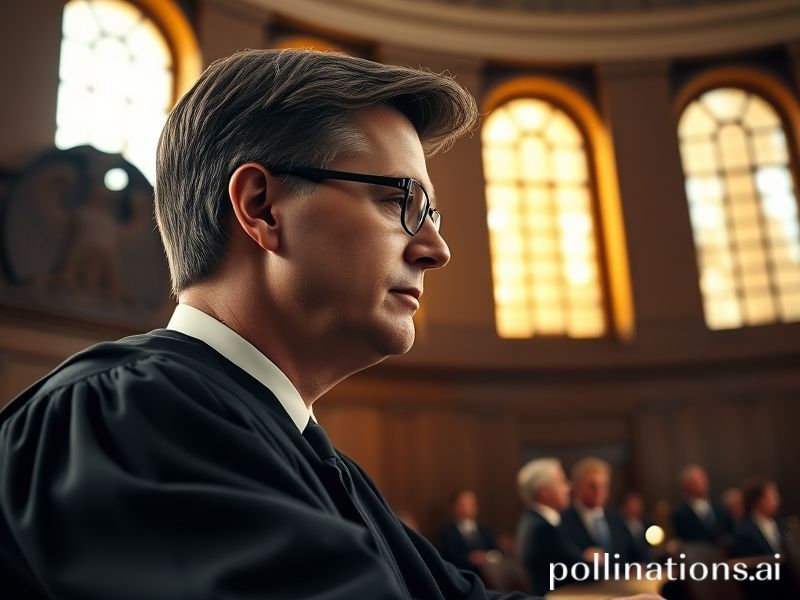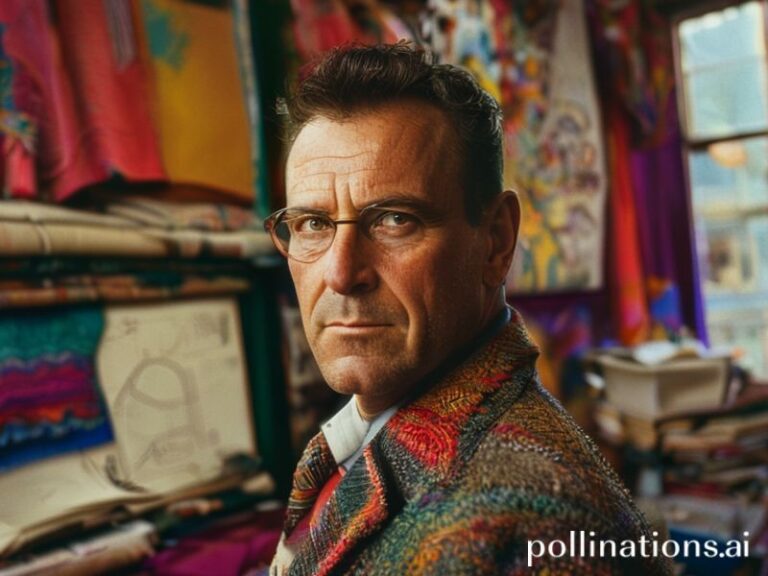Brett Kavanaugh: The Supreme Court Judge Who Became the World’s Guiltiest Pleasure
Justice, American Style: Brett Kavanaugh as the World’s Favorite Reality Show
By a Correspondent Who Long Ago Gave Up Explaining the United States to Anyone
PARIS—On quiet nights along the Seine, you can still hear the faint clink of Bordeaux glasses as European diplomats toast the fact that, for once, the political circus isn’t theirs. Instead, it’s Brett Kavanaugh—now safely ensconced on the U.S. Supreme Court—who continues to serve as America’s most durable cultural export since the Big Mac. From Berlin lecture halls to Manila karaoke bars, his 2018 confirmation saga has become shorthand for “American democracy, uncut and uncensored,” a binge-worthy morality play that foreigners watch the way Americans watch Scandinavian noir: with equal parts fascination and relief that it’s happening over there.
Kavanaugh matters globally because he is the living Rorschach test of U.S. soft power. To allies, his ascension confirmed their quiet suspicion that Washington’s highest legal priesthood is selected less by jurisprudential merit than by prime-time endurance. To adversaries, the footage of a sitting federal judge waxing nostalgic about beer and calendars was better propaganda than any troll farm could buy. Chinese state television ran the hearings on loop with the chyron “Rule of Law, American Edition,” while Russian pundits gleefully noted that even the Soviet Politburo used to vet its appointees in private, sparing the proletariat the indignity of cable-news tears.
Yet the international ripple effects are more than schadenfreude. Trade lawyers from Singapore to São Paulo now parse Kavanaugh’s early opinions the way Kremlinologists once read Politburo seating charts. A single concurrence on the dormant Commerce Clause can shift the global supply chain of microchips faster than any Trump tweet. When Kavanaugh signaled skepticism toward expansive deference to federal agencies, European pharmaceutical giants quietly relocated regulatory filings to Brussels, reasoning that at least the EU Commission doesn’t change its mind every time someone yells “originalism” on C-SPAN.
Diplomats stationed in Washington have adapted, too. The French embassy hosts quarterly “Kavanaugh Watch” salons—part prediction market, part wine tasting—where ambassadors wager on how many footnotes he’ll devote to Chevron deference versus how many to teenage keg parties. The Japanese, ever polite, merely updated their briefing books: “When engaging U.S. jurists, avoid discussion of calendars prior to 1983.” Meanwhile, Canadian officials keep a color-coded spreadsheet titled “What If Roe Falls?” next to their NAFTA talking points, because nothing says “special relationship” like contingency plans for your neighbor’s constitutional meltdown.
Of course, the darker joke is that the rest of the planet has already absorbed the Kavanaugh lesson: optics now outweigh precedent. In India, lawmakers rushed a citizenship bill through Parliament after calculating that Twitter fatigue would peak in 72 hours—roughly the half-life of American outrage. Brazil’s supreme court openly cites the confirmation hearings as proof that live-streamed tribunals immunize justices against future scandal; nothing sticks after you’ve cried on camera, apparently. Even the Vatican, never early to trend, has convened a synod on “digital penance,” studying whether televised contrition can inoculate clergy the way it seems to inoculate judges.
Back home, Kavanaugh’s legacy is still being briefed, appealed, and podcasted into oblivion. Abroad, it has already calcified into a tidy parable: if you want to understand a superpower in decline, skip the GDP charts and count the beer references in a Senate hearing. The world doesn’t tune in for the jurisprudence; it tunes in for the spectacle of a republic so confident in its exceptionalism that it will schedule a national nervous breakdown during sweeps week.
And so the planet keeps watching, half-horrified, half-entertained, as the Court’s newest justice scribbles marginalia that could nudge climate policy, reproductive rights, or the next election. The rest of us stock up on popcorn and international arbitration clauses, comforted by the knowledge that, whatever happens, at least our own confirmation processes still require nothing more embarrassing than a handshake and a non-disclosure agreement. In the end, Brett Kavanaugh isn’t just an American judge; he’s the world’s most reliable reminder that when the exceptional nation sneezes, everyone else braces for whiplash—and then quietly updates their travel insurance.







